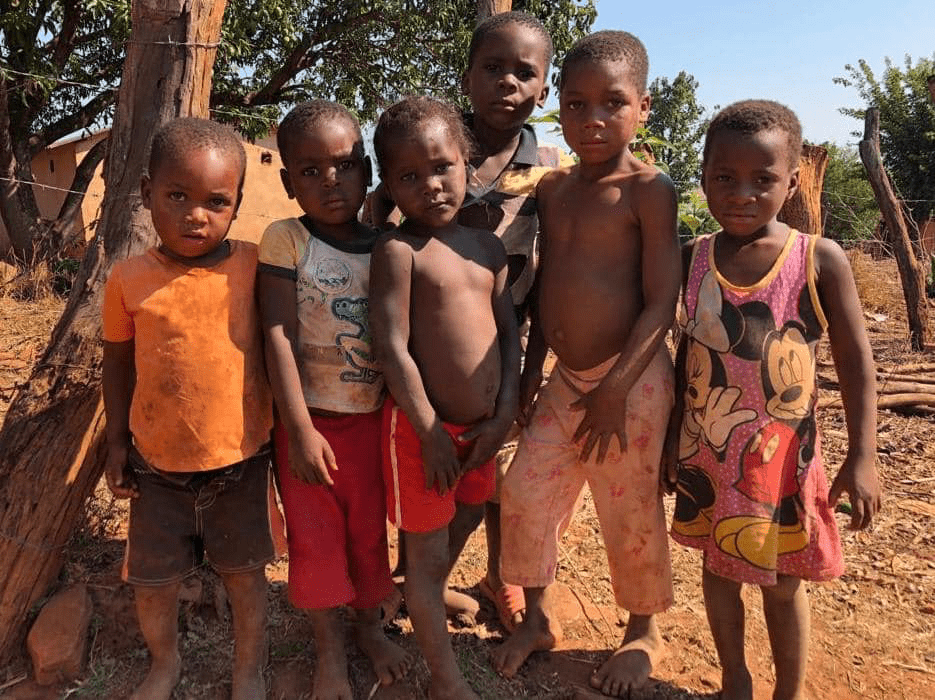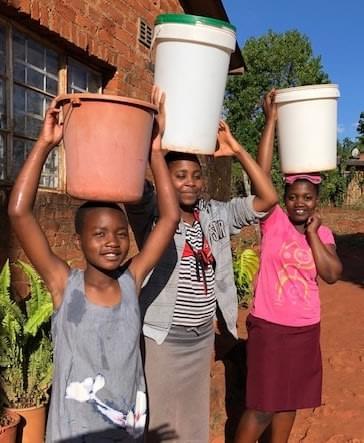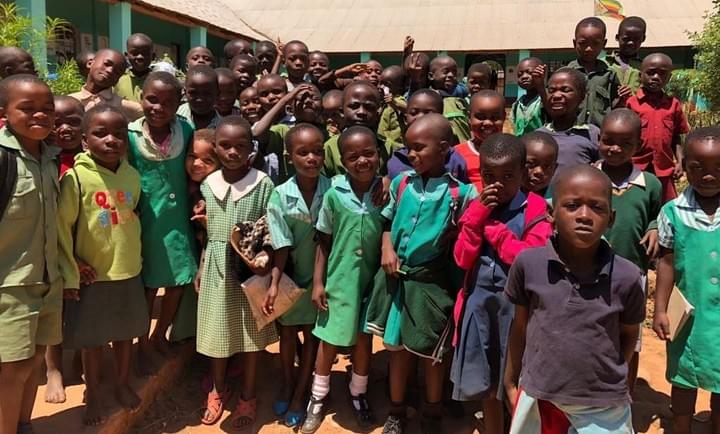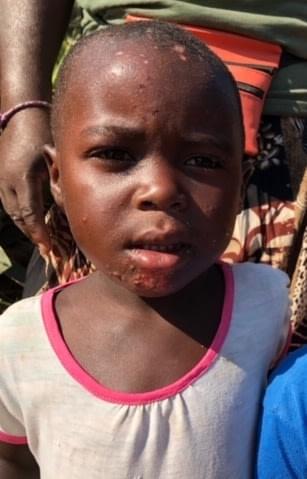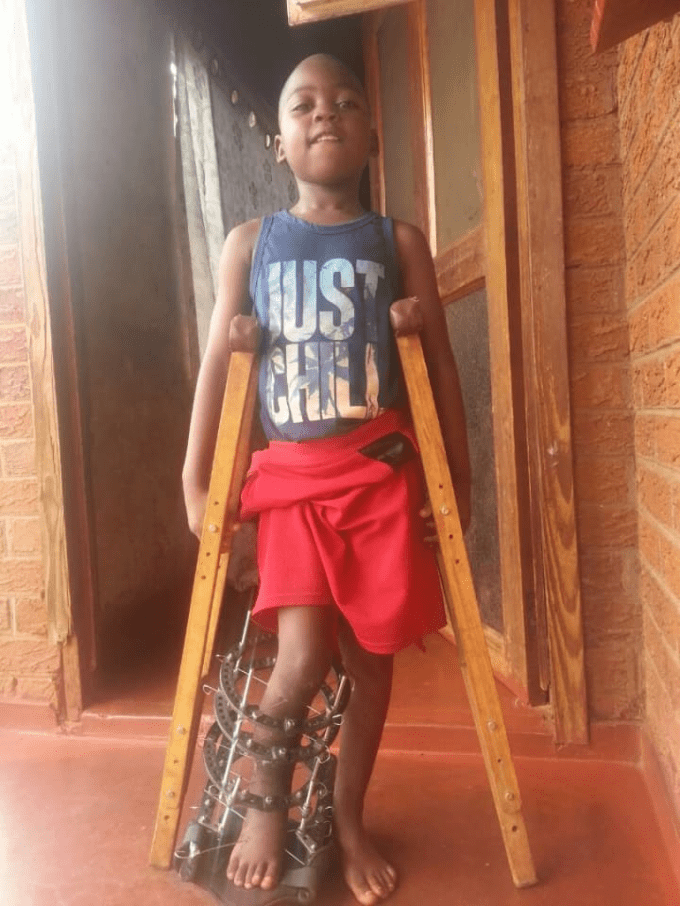


A Light For Zimbabwe
A Light For Zimbabwe is a 501 c (3) tax exempt non-profit organization, registered with the State of New Hampshire. It is dedicated to the betterment of the lives of Southeastern Zimbabwean families, located primarily in Chipinge District in the Province of Manicaland. A Light for Zimbabwe, is focused on empowering people, instead of enabling them through education, Orphan Sponsorships and Sustainable Projects.
Latest News from Zimbabwe
ALFZ volunteers Prosper Sidhuli and Winston Mapungwana delivered medical equipment and PPE to Chikore and Mt. Selinda Hospitals. This donation included an oxygen concentrator, nebulizers with medication, gowns, gloves, masks, hand sanitizer, and pulse oximeters. The clinic and hospital had no equipment or protection to treat COVID-19 patients prior to this donation. ALFZ continues to support our students and families through this pandemic. Thank you to all of our donors and supporters for making this possible.
Mission Statement
The mission of a Light for Zimbabwe is to empower children, specifically orphans, by providing sponsorships for school fees from primary through secondary school. In special cases, college scholarships may be obtained for a few based on merit and need. Donations will also be used to establish sustainable projects for rural villages and individuals to promote independence and self reliance. Additionally, through the Village Health Worker program, we strive to meet basic screening and health care needs in remote areas as well as early identification of special needs such as children who are not attending school or who are otherwise at risk as well as caregivers in need of support.
Compassion, a willingness to serve and a commitment to change are gifts we all can share.

Zimbabwe Facts
Zimbabwe is a landlocked country in Southeastern Africa located between the Zambezi and Limpopo rivers. It has a population of 15.25 million in an area of 151,000 sq miles and is home to Victoria Falls, one of the natural wonders of the world.
The official language is English although most people are bilingual speaking either Shona or Ndebele as well.
The UN Office for Coordinating Humanitarian Affairs [OCHA] reported continuing concerns about Zimbabwe. Once known as the breadbasket of Africa, socioeconomic hardships, climate change, drought and poor harvests leave many at risk for hunger. Child malnutrition is estimated at 35%.
Unemployment remains very high at 85-95%. Most of the population survives on less than $1/day. Many children cannot afford to go to school putting the previous literacy rate of 90% in peril.

In rural Zimbabwe access to such essentials as clean water, school, food and health care is a daily challenge. Clean water is critical for the prevention of waterborne diseases. Often, it is obtained from rivers and streams used for bathing, laundry and shared with animals. Women and children often walk up to 10 miles carrying buckets of water or 50# bags of grain on their heads.
Orphan Sponsorship

"The journey of 1000 miles starts with a single step." [L.B. a college student]
In the hills and villages of beautiful Zimbabwe live a generation of children without parents. Because of poverty, many of these orphans do not have the opportunity to go to school. An orphaned teenager may be thrust into caring for his/her siblings in child-headed households as extended families are stretched way beyond their limits. Theirs are stories of resilience that give us reason to hope. A Light for Zimbabwe is challenged to look beyond what might seem impossible and say 'yes' to the opportunity to make a difference.
Sponsorships are available at all levels of financial commitment; every donation counts! Your caring gifts mean hope on the horizon where before there was none.

With the help of caring friends and donors we have more than doubled our orphan sponsorships to 75, from primary through secondary school.
We provide school fees, shoes, a uniform, school supplies as well as basic food and staple items to the most needy.
Ten of our sponsored students have graduated from college and are now employed as lawyers, bankers, accountants and others are teacher certified. Recently, some of our graduates now pay it forward by sponsoring young students in our program.
For others, technical training in fields such as, sewing, carpentry, wood and metal working, mechanics, etc. is more practical and gives a hand up out of dependence. Upon completion, these students will be employable, equipped to start small businesses, and able to determine their own futures.
Education is the key to breaking the cyclical nature of poverty. As these young people complete their education, they shine as beacons of hope to others. A Light for Zimbabwe believes that by reaching out to someone in need you can change a life forever.
Sustainable Projects
The UN World Food Programme reported that millions will need food assistance especially during the hunger season. There are already signs of distress in both rural and urban areas. Contributing factors included erratic rainfall, drought, and limited access to seed and fertilizer. Manicaland Province, which includes Chikore and Mt. Selinda, is one of the worst affected areas. Giving small grants for sustainable agricultural projects both provides a safety net and preserves dignity.
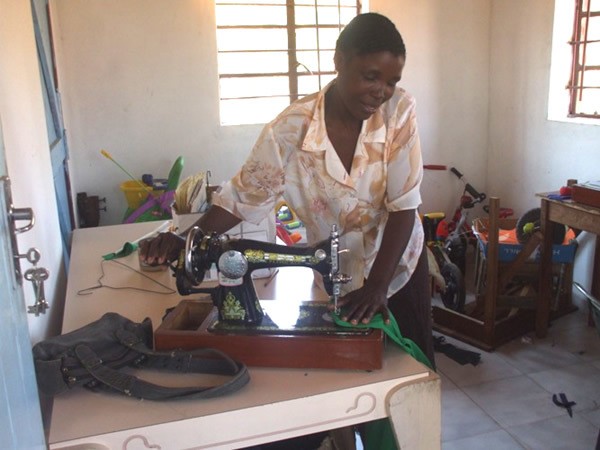
Fashion and Fabrics
We have been augmenting the fashion and fabrics classes in secondary schools by providing hand-operated sewing machines. Hand-operated sewing machines are the best choice because of intermittent electricity in Zimbabwe. This program will provide students with a marketable skill; a step toward independence.

Small Farm Animal Projects
ALFZ has supported and funded sustainable, successful small farm animal projects in 5 villages and Chikore Hospital over the years. A local Agricultural Extension Officer provided the expertise, teaching and ongoing support. 5 Villages formed groups of 8-10 people who divide the tasks of caring for and selling chicks and goats.
These community projects have given villagers the ability to expand their farm projects to include other animals such as; pigs, turkeys and goats. These inititatives have sewed the seed of hope for future self-reliance.
(Photo: As a result of a self-sustaining poultry project, this father of 6 is now able to provide for his family including 4 additional orphaned children.)
Health and Diseases
Without basic medical care people are suffering and dying needlessly.

HIV/AIDS
Facts: According to the World Health Organization, life expectancy in Zimbabwe is 45 for women and 46 for men. 60% of the worlds 40 million people with HIV/AIDS and 2/3 of the worlds AIDS related deaths are in Sub-Saharan Africa. In Zimbabwe, this means that 1.3 million are affected in a population of 11,600,000. Despite the fact that the overall incidence of HIV/ AIDS is declining due to increased awareness of cause, treatment and prevention, 34% of sexually active adults are HIV positive. One third of today's 15 year olds will die from this preventable disease.
Prevention: Education about transmission and prevention has increased at Hospitals, Clinics, Schools and Churches. Early Diagnosis, treatment and lifetime compliance with medication regimes is encouraged. Anti-retrovirals are now available at designated sites along with lab monitoring to measure effectiveness of treatment. Mt Selinda and Chikore Hospitals now offer HIV/AIDS clinics. Early treatment and diagnosis can mean the difference between life and death.

Malaria
The second most common disease is Malaria which is carried by the Anopheles mosquito which is tiny, silent and has mutated to a more deadly variety which is resistant to drugs that were formerly effective. It claims the life of an African child every 30 seconds. It is a waterborne disease which thrives in the rainy season November to June . There are few mosquito control programs.
Malaria is curable if treated promptly. Left untreated, it progresses to the brain causing convulsions, delerium , coma and death. There is research at the international level to develop drugs that will be more widely available.

Malnutrition
Zimbabwe was once the bread basket of Africa, but now drought and poor harvests have led to declining food security and increasing hunger. Maize production has fallen an estimated 46% in 2018 partly as a result of climate change. Rising world food costs and high unemployment compound the problem and make it difficult for many to afford even staple foods. Babies, children the elderly and those with chronic diseases are most at risk for death from malnutrition.
"Zimbabwe's children deserve better. They deserve to go to school, to drink clean water, to receive quality health care and to go to bed without feeling hungry." -
-United Nations

Cholera
Cholera is a waterborne disease that causes acute, massive diarrhea leading to dehydration and death if not promptly treated. It is curable with with early intervention including re- hydration and antibiotics. It will remain a threat as long as water sources are unreliable. Cholera is highly contagious and spread by personal contact in addition to ingesting contaminated water. Prevention includes careful handwashing with soap, drinking water from protected sources or boiling clear water for 5 minutes. New bore holes [wells] are an ongoing and critical need.

Chikore Hospital
Chikore is a small hospital clinic in a remote area that is difficult to reach due to poor road conditions. It serves a large area that encompasses 40 km including 44 villages. Accessing healthcare is a big challenge and patients arrive on foot, by wagon or wheelbarrow; the more fortunate may have a donkey, ox cart, or occasionally a vehicle. Distance and poverty are the largest deterrents to basic health care and far too many succumb to readily treatable conditions.
A Doctor from Mt. Selinda Hospital visits only once a month; otherwise the nurses manage all the cases to the best of their ability. Chikore Hospital also includes a waiting mothers shelter as well as an HIV Clinic. Medications and supplies are scarce or unavailable and the lack of support and resources constrain primary health care.
How You Can Help
As we look forward, we continue to evaluate those opportunities that might yield the greatest benefit from your kind and generous donations.
WE WILL CONTINUE:
- Educational sponsorships for children most in need
- Monthly food supplements to targeted families
- Partnering with livestock experts to expand farm animal projects
- Participate in container shipments
FUTURE GOALS:
- Expand the number of sponsorships
- Promoting vocational-technical training programs
- Improve water access in remote villages
How you can help
- $25 Buys a pair of shoes or a school uniform
- $150 Sponsors a primary school student for 1 year
- $125 Provides a hand-operated sewing machine for a school or individual
- $300 Sponsors a high school student for 1 year
- $350 Seed money for a poultry project [chicks and feed]
- $1,800 provides tuition for one year of technical college
- $2,400 provides tuition for one year of university
100% of your tax-deductible donations will benefit the people of Zimbabwe.
Social Feed
Follow us on Facebook for updates
Contact US
A Light For Zimbabwe
P.O. Box 993
Concord, NH 03302




